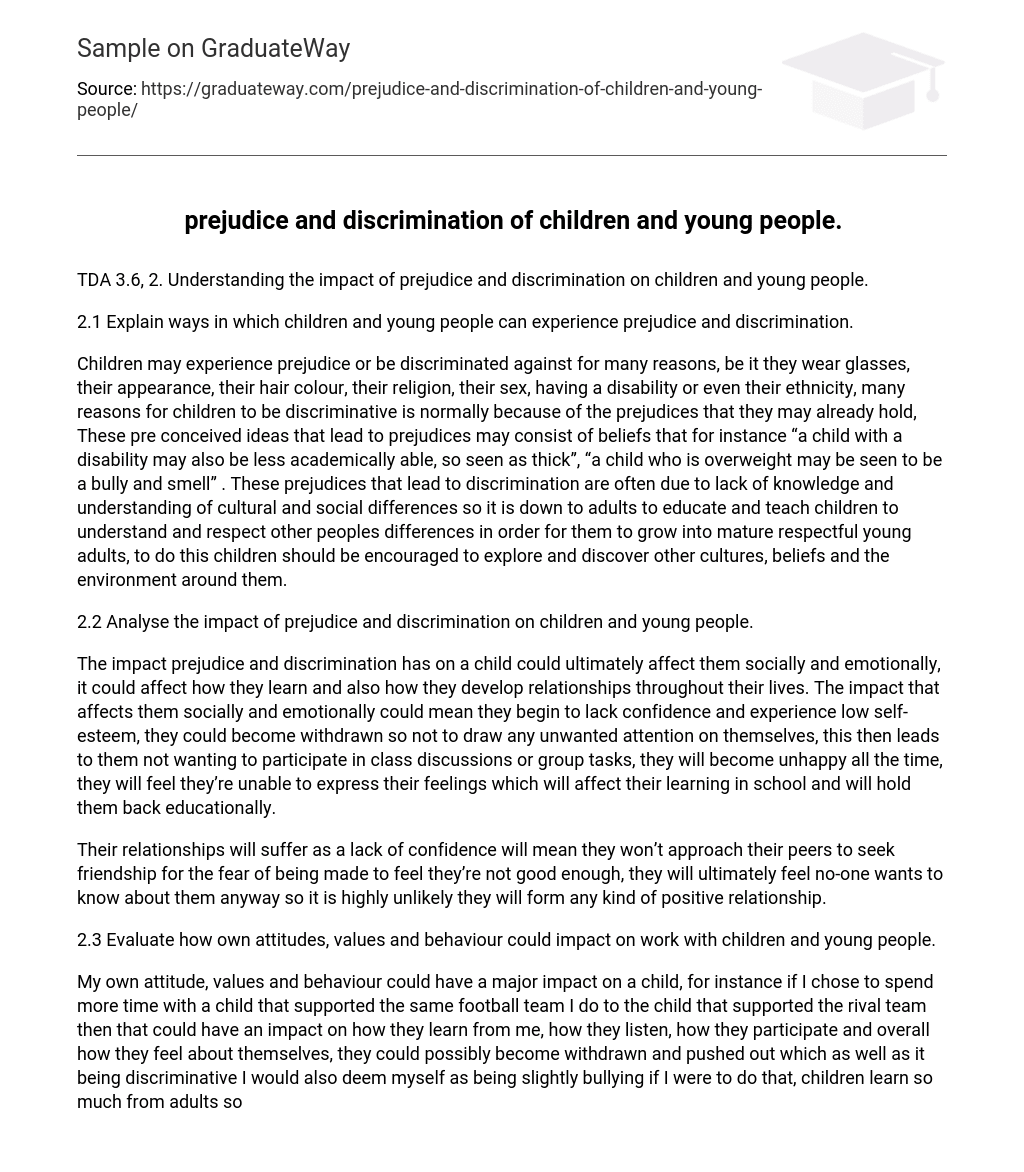Children may experience prejudice or be discriminated against for many reasons, be it they wear glasses, their appearance, their hair colour, their religion, their sex, having a disability or even their ethnicity, many reasons for children to be discriminative is normally because of the prejudices that they may already hold, These pre conceived ideas that lead to prejudices may consist of beliefs that for instance “a child with a disability may also be less academically able, so seen as thick”, “a child who is overweight may be seen to be a bully and smell” . These prejudices that lead to discrimination are often due to lack of knowledge and understanding of cultural and social differences so it is down to adults to educate and teach children to understand and respect other peoples differences in order for them to grow into mature respectful young adults, to do this children should be encouraged to explore and discover other cultures, beliefs and the environment around them.
The impact prejudice and discrimination has on a child could ultimately affect them socially and emotionally, it could affect how they learn and also how they develop relationships throughout their lives. The impact that affects them socially and emotionally could mean they begin to lack confidence and experience low self-esteem, they could become withdrawn so not to draw any unwanted attention on themselves, this then leads to them not wanting to participate in class discussions or group tasks, they will become unhappy all the time, they will feel they’re unable to express their feelings which will affect their learning in school and will hold them back educationally.
Their relationships will suffer as a lack of confidence will mean they won’t approach their peers to seek friendship for the fear of being made to feel they’re not good enough, they will ultimately feel no-one wants to know about them anyway so it is highly unlikely they will form any kind of positive relationship.
My own attitude, values and behaviour could have a major impact on a child, for instance if I chose to spend more time with a child that supported the same football team I do to the child that supported the rival team then that could have an impact on how they learn from me, how they listen, how they participate and overall how they feel about themselves, they could possibly become withdrawn and pushed out which as well as it being discriminative I would also deem myself as being slightly bullying if I were to do that, children learn so much from adults so my own beliefs and attitudes towards different aspects of life should remain my own beliefs and not be forced onto anybody else especially a child, showing a child differences and encouraging them to explore is one thing but to exclude a child or treat a child differently for having a different attitude, value or behaviour to myself would be totally inappropriate and have devastating effects on my career as well as the children I work with.
Promoting anti-discriminatory practice I feel would need to be done by having positive relationships with all children and adults as individuals, show respect to a child that offers their opinion by communicating with them, support children who have additional needs the same way you support a child without, encourage a child to express their beliefs with other children and allow the other children to explore this in order for them to gain an understanding, challenge any discriminative behaviour if it occurs in the correct manner and promote individuality.
Challenging discriminative behaviour is vital as children need to know that discriminatory behaviour is not acceptable and by ingoring discriminative behaviour it can be seen as the behaviour is being condoned, most cases of discrimination from children is due to ignorance or a lack of understanding so if a particular discriminative comment or action is being made to the same child/ children then maybe setting a lesson aside to teach all children the implications of their behaviour and give them the knowledge to gain an understanding of their differences rather than allowing the behaviour to carry on which in turn will result in the loss of trust from the child/children who are being discriminated against as they will start to believe you are of the same opinion as the perpetrators.
Bibliography
Burnham, L Baker, B (2011) supporting teaching and learning in schools (primary) Heinemann work based learning Essex





